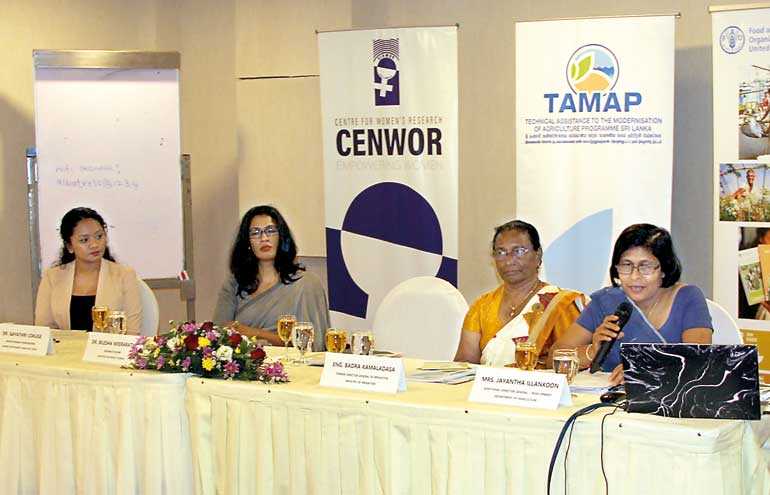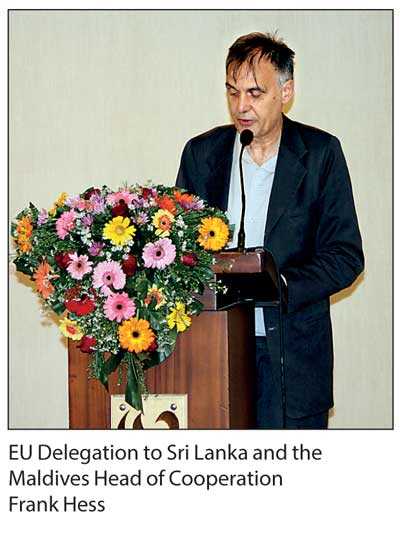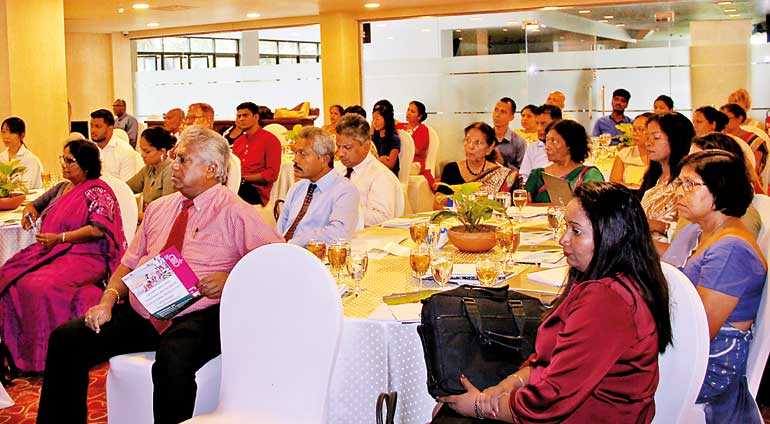Monday Feb 23, 2026
Monday Feb 23, 2026
Tuesday, 17 March 2020 00:02 - - {{hitsCtrl.values.hits}}
- Symposium on ‘Supporting Agricultural Productivity through Gender Inclusion’ sheds light on initiatives

Panel discussion from left: IPS Research Fellow Bilesha Weeraratne, Department of Irrigation former Director General Eng. Badra Kamaladasa and Department of Agriculture Additional Director General – Development Jayantha Illankoon
Commemorating International Women’s Day 2020, the European Union-funded Technical Assistance to the Modernisation of Agriculture Programme (TAMAP), in collaboration with the Food and Agriculture Organization (FAO) and Centre for Women’s Research (CENWOR), conducted a symposium titled ‘Supporting Agricultural Productivity through Gender Inclusion’ recently.
The symposium held on 13 March at Waters Edge, Battaramulla, provided a space for development practitioners in the agriculture sector to express their ideas and perspectives on how gender inclusion can contribute towards increased productivity of the sector.
Additionally, the symposium served as a timely activity to draw the attention of policy makers, donors, project developers, private sector representatives, researchers and the general public to understand Sri Lanka’s ongoing initiatives to maximise women’s contribution to the economic development of the country. 
Frank Hess, Head of Cooperation of the EU Delegation to Sri Lanka and the Maldives stated: “Women’s contribution to agriculture is both underestimated and underused in Sri Lanka. If more women were involved in decision-making, this would be beneficial not just for the women but for the whole family.”
Female participation in the labour force is at a low level of only 35% at present and it is hoped that these initiatives would result in an increase in the participation of women in the workforce, maximising women’s contribution to the economic development of the country.
Findings of two recent studies; ‘Gender Equitable Agricultural Policies’ conducted by CENWOR and ‘Gender Responsiveness of 2018 Agriculture Sector Budget’ commissioned by the European Union were shared among the audience.
According to the research, women engage significantly in all agricultural sub sectors and work hand in hand with men. In Sri Lanka, the agricultural sector contributes 7.7% to the GDP and employs 27% of the population, out of which 38% are women. Out of 2.1 million agricultural households in Sri Lanka, 19% are female-headed. Of 2.3 million agricultural operators, 75% are male and 25% are female. Among the contributing family workers 78.9% are female and 21.1% are male.
However, the majority of women in agriculture practice subsistence agriculture, which is considered ’small economy’, and the estimated earned income female/male ratio is 0.31%. Moreover, women have to face challenges in accessing land, extension services, and usually their engagement in mechanised agriculture and cash crop cultivation is not promoted.
Women remain mostly as unskilled agricultural labour. Thus is it timely to promote both women and men equally in smart farming practices and digitalised agriculture. Studies show women need to be in the high end of the value chain and be given access to technology to ensure value addition. Additionally, gender-inclusive modernised agriculture can slow down the current shift of labour from agriculture to the service sector which can result in a negative impact on the agricultural sector’s productivity in the long run.
The symposium also included a panel discussion and facilitated deliberations on key topics. Participants included Department of Agriculture Additional Director General – Development Jayantha Illankoon on ‘Gender inclusive planning and budgeting increasing agricultural productivity,’ Centre for Poverty Analysis Senior Research Professional Gayathri Lokuge on ‘Sustainable Development Goals (SDG) 2030 Agenda – Leaving no one behind: Women led agro-based livelihood and food security,’ Department of Irrigation former Director General Eng. Badra Kamaladasa on ‘Gender inclusion in irrigation and natural resources management,’ and Institute of Policy Studies Research Fellow Dr. Bilesha Weeraratne on ‘Data-driven agriculture – importance of sex-disaggregated data in gender equitable planning and budgeting’. At the end of the discussions, a vibrant question and answer session followed.
The deliberations of the symposium will be useful input to the strategy being developed collaboratively by the Ministry of Finance, Economy and Policy Development, the Ministry of Mahaweli, Agriculture, Irrigation and Rural Development and TAMAP in line with the Overarching Agricultural Policy and the subsequent Implementation Strategy.

Attendees at the symposium